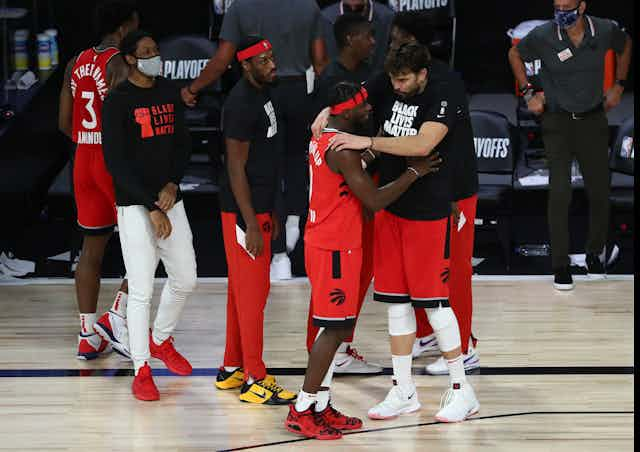On Aug. 26, the Milwaukee Bucks boycotted Game 5 of their first-round series in the NBA playoffs against the Orlando Magic. The Bucks refused to play in response to the shooting of Jacob Blake seven times in the back by a police officer in Kenosha, Wis.
The players’ action followed talk by both the Toronto Raptors and Los Angeles Lakers of refusing to play their respective games in protest of the shooting of Blake, a Black man.
The Bucks’ action echoed throughout the league and in response, the NBA postponed games on Aug. 26 and 27, with talk of resuming the playoffs on Friday or Saturday.
Sports and politics
Professional basketball players have become increasingly political, attending news conferences wearing clothing with social justice messaging, including Black Lives Matter, Say Their Names and Vote, to name a few. The NBA unveiled a court emblazoned with the Black Lives Matter logo to support the movement against racial injustices in the United States and Canada.
Players also used media appearances to talk about fighting for change and demanding justice for Breonna Taylor and other victims of police violence. The Toronto Raptors, in particular, arrived for the season at Disney World in two large black buses with the Black Lives Matter logo.
Compared to other professional sports leagues, the NBA has been at the vanguard of promoting social justice, and not because of one particular executive or person who has risen to the occasion, but because collectively, the organization understands that sport has the power to bring about change.
Protesting the violence
Players cannot refuse to play unilaterally, because the NBA and the players’ union need to negotiate the details before a potential boycott can occur. Nevertheless, according to NBA sources, the union said they would support the players regardless of what they want to do and provide them with more information on the advantages and disadvantages of boycotting games.

Sports boycotts
Generally speaking, sports boycotts have occurred in international competitions to protest repressive regimes. For example, in 1980, the United States and 61 other nations boycotted the Moscow Olympics to protest the Soviet invasion of Afghanistan. More recently, nations were advised by human rights activists to boycott the 2014 Winter Olympics in protest of Vladimir Putin’s oppression of gays and lesbians.
It is difficult to measure whether these past boycotts have been successful in terms of radically bringing about desired outcomes, but perhaps that’s not the purpose of boycotts.
As long as there are people and organizations carrying out acts of resistance, there’s hope for political mobilization that could spark significant social and political change.
And that’s what the NBA can do at this juncture: continue resisting the social conditions that allow Black men and women to die at the hands of police.

